The antioxidant and neurochemical activity of Apium graveolens L. and its ameliorative effect on MPTP-induced Parkinson-like symptoms in mice
- PMID: 29558946
- PMCID: PMC5859653
- DOI: 10.1186/s12906-018-2166-0
The antioxidant and neurochemical activity of Apium graveolens L. and its ameliorative effect on MPTP-induced Parkinson-like symptoms in mice
Abstract
Background: Apium graveolens L. is a traditional Chinese medicine prescribed as a treatment for hypertension, gout, and diabetes. This study aimed to determine the neuroprotective effects of A. graveolens extract against a Parkinson's disease (PD) model induced by 1-methyl-4-phenyl-1,2,3,6-tetrahydropyridine (MPTP) in C57BL/6 mice.
Methods: Male C57BL/6 mice treated with MPTP were orally dosed with A. graveolens extract daily for 21 days. Behavioral tests, including a rotarod apparatus, a narrow beam test, a drag test, a grid walk test, a swimming test, and a resting tremor evaluation, were performed. Thereafter, the mice were sacrificed, and monoamine oxidase A and B activity, lipid peroxidation activity, and superoxide anion levels were measured. Immunohistochemical staining of tyrosine hydroxylase was performed to identify dopaminergic neurons.
Results: We found that treatment with A. graveolens at dose of 375 mg/kg demonstrated the highest effect and led to significant improvements in behavioral performance, oxidative stress parameters, and monoamine oxidase A and B activity compared with the untreated group (p < 0.05). Moreover, the extract increased the number of neurons immunopositive for tyrosine hydroxylase expression compared with MPTP alone or MPTP with a positive control drug (p < 0.05).
Conclusions: We speculated that A. graveolens ameliorated behavioral performance by mediating neuroprotection against MPTP-induced PD via antioxidant effects, related neurotransmitter pathways and an increase in the number of dopaminergic neurons.
Keywords: A. graveolens; MPTP; Monoamine oxidase; Oxidative stress; Tidomet plus; Tyrosine hydroxylase.
Conflict of interest statement
Ethics approval
The study protocol was approved by the Animal Ethics Committee of Prince of Songkla University (Reference no. MOE0521.11/582) before the start of this study.
Consent for publication
All authors signed the paper and agreed to publish it.
Competing interests
The authors declare that they have no competing interests.
Publisher’s Note
Springer Nature remains neutral with regard to jurisdictional claims in published maps and institutional affiliations.
Figures
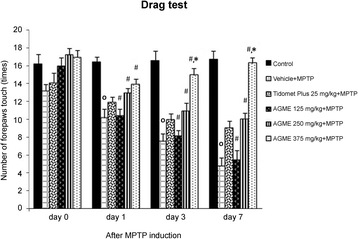
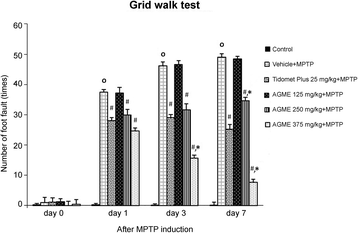
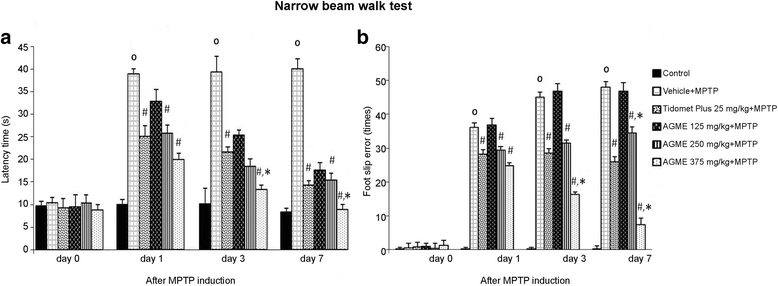
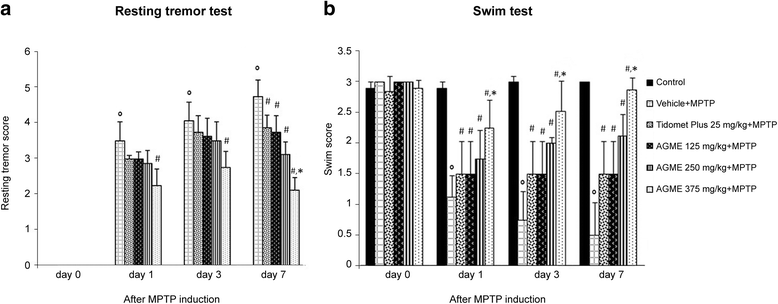
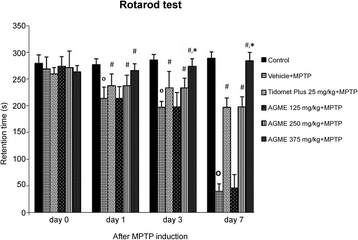
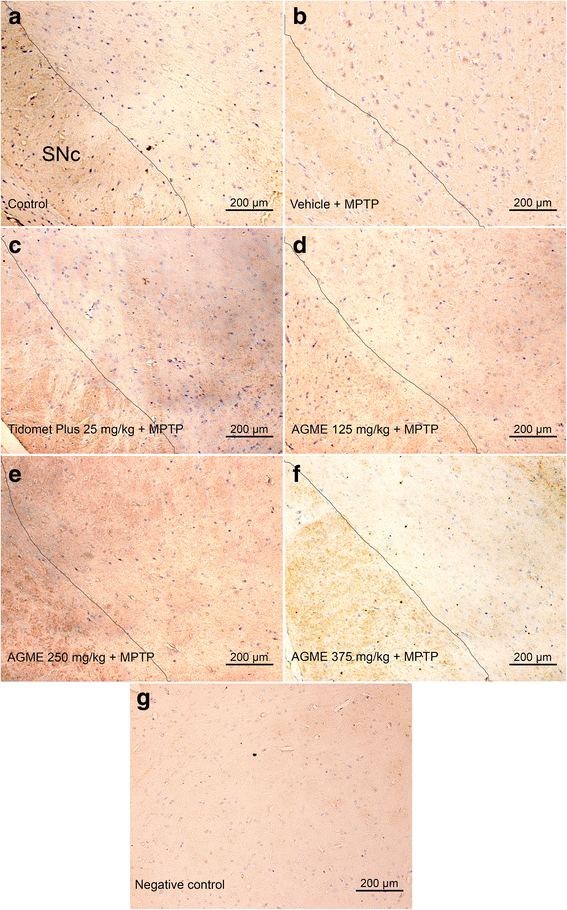
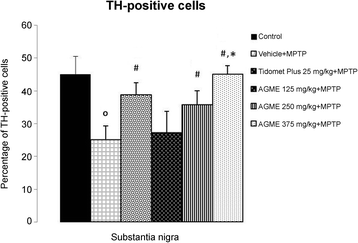
Similar articles
-
Neuroprotective Effect of Schisandra Chinensis on Methyl-4-Phenyl-1,2,3,6-Tetrahydropyridine-Induced Parkinsonian Syndrome in C57BL/6 Mice.Nutrients. 2019 Jul 21;11(7):1671. doi: 10.3390/nu11071671. Nutrients. 2019. PMID: 31330885 Free PMC article.
-
Neuroprotective potential of plant derived parenchymal stem cells extract on environmental and genetic models of Parkinson disease through attenuation of oxidative stress and neuroinflammation.Metab Brain Dis. 2023 Feb;38(2):557-571. doi: 10.1007/s11011-022-01120-3. Epub 2022 Nov 19. Metab Brain Dis. 2023. PMID: 36401682
-
Comparative evaluation of extract of Bacopa monnieri and Mucuna pruriens as neuroprotectant in MPTP model of Parkinson’s disease.Indian J Exp Biol. 2016 Nov;54(11):758-66. Indian J Exp Biol. 2016. PMID: 30179419
-
The intranasal administration of 1-methyl-4-phenyl-1,2,3,6-tetrahydropyridine (MPTP): a new rodent model to test palliative and neuroprotective agents for Parkinson's disease.Curr Pharm Des. 2011;17(5):489-507. doi: 10.2174/138161211795164095. Curr Pharm Des. 2011. PMID: 21375482 Review.
-
Neurological Applications of Celery (Apium graveolens): A Scoping Review.Molecules. 2023 Aug 2;28(15):5824. doi: 10.3390/molecules28155824. Molecules. 2023. PMID: 37570794 Free PMC article.
Cited by
-
Therapeutic Potential of Natural Products in Treating Neurodegenerative Disorders and Their Future Prospects and Challenges.Molecules. 2021 Sep 2;26(17):5327. doi: 10.3390/molecules26175327. Molecules. 2021. PMID: 34500759 Free PMC article. Review.
-
Plant-Based Diets and Phytochemicals in the Management of Diabetes Mellitus and Prevention of Its Complications: A Review.Nutrients. 2024 Oct 30;16(21):3709. doi: 10.3390/nu16213709. Nutrients. 2024. PMID: 39519546 Free PMC article. Review.
-
Oxidative Stress in Parkinson's Disease: Potential Benefits of Antioxidant Supplementation.Oxid Med Cell Longev. 2020 Oct 12;2020:2360872. doi: 10.1155/2020/2360872. eCollection 2020. Oxid Med Cell Longev. 2020. PMID: 33101584 Free PMC article. Review.
-
Minocycline inhibition of microglial rescues nigrostriatal dopaminergic neurodegeneration caused by mutant alpha-synuclein overexpression.Aging (Albany NY). 2020 Jul 24;12(14):14232-14243. doi: 10.18632/aging.103440. Epub 2020 Jul 24. Aging (Albany NY). 2020. PMID: 32706757 Free PMC article.
-
Rosinidin inhibits NF-κB/ Nrf2/caspase-3 expression and restores neurotransmitter levels in rotenone-activated Parkinson's disease.Saudi J Biol Sci. 2023 Jun;30(6):103656. doi: 10.1016/j.sjbs.2023.103656. Epub 2023 Apr 23. Saudi J Biol Sci. 2023. PMID: 37187936 Free PMC article.
References
-
- Eriksen JL, Petrucelli L. Parkinson’s disease-molecular mechanisms of disease. Drug Discov Today Dis Mech. 2004;1:399–405. doi: 10.1016/j.ddmec.2004.11.016. - DOI
MeSH terms
Substances
LinkOut - more resources
Full Text Sources
Other Literature Sources
Medical

